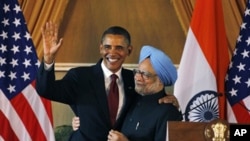U.S. President Barack Obama, in his recent address before the United Nations General Assembly, hailed open society and open government. He called on countries to bring to the United Nations next September their "specific commitments" to transparency, citizen empowerment, and democratic accountability. He emphasized that "part of the price of our own freedom is standing up for the freedom of others."
During his visit this month to Mumbai, India, President Obama attended the Expo on Democracy and Open Government, which highlighted Indian civil society’s harnessing of new technology and innovations to strengthen India's democracy by fighting corruption, holding government officials accountable, and empowering citizens to seek the changes that would benefit them. The Expo showcased Non-Governmental Organizations that worked on placing government information in the public domain, strengthening the electoral process, promoting direct citizen participation in local governments, and improving government accountability and the delivery of services.
Capitalizing on the creativity and innovation that Americans and Indians are bringing to these issues, President Barack Obama and Prime Minister Manmohan Singh announced that they are launching a US-India Partnership on Open Government to propel forward the efforts of both nations and to offer support to reformers and activists in other interested countries.
Both India and the United States believe that democratizing access to information and energizing civic engagement through the use of new technologies are critical to delivering better services, especially to the poorest in society; fostering greater entrepreneurship and economic opportunity; and holding government officials accountable.
"If Indian civil society groups should choose to share their experiences with citizens and Non-Governmental Organizations in countries that have only recently embarked on their democratic journeys, the dividend will be profound," Samantha Power, Senior Director and Special Assistant for Multilateral Affairs and Human Rights, remarked. "India is at the vanguard of figuring out how to exploit technology and innovation on behalf of democratic accountability. U.S.-based groups, as well as those throughout the developed and developing world, could learn an enormous amount from these efforts."
U.S. - India Partnership

U.S. President Barack Obama, in his recent address before the United Nations General Assembly, hailed open society and open government.



